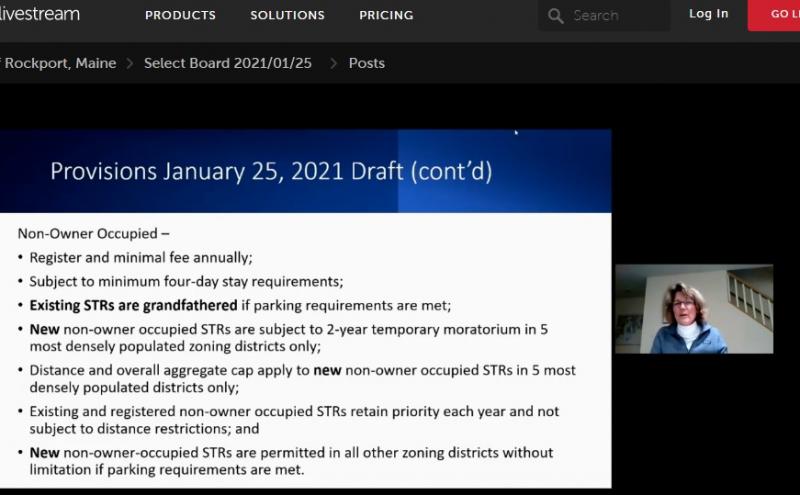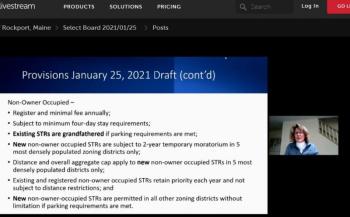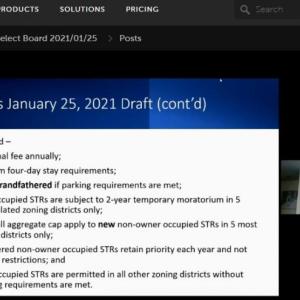Third draft of ordinance presented during meeting
Rockport Select Board divided over timeline, need for short-term rental ordinance
Mon, 01/25/2021 - 11:00pm
ROCKPORT – After hearing a presentation Jan. 25 on a third draft of a proposed short-term rental ordinance, some members of the Rockport Select Board expressed concerns over the proposed deadline of a public vote in June on the ordinance, as well as the very need for such regulations in the municipality.
Select Board Chair Debra Hall and board member Denise Kennedy-Munger presented to remaining board members, Mark Kelley, Michelle Hannan and Jeff Hamilton the third and most recent draft of an ordinance which would regulate short-term rentals in Rockport; the document differentiates between rental properties which are owner-occupied and those which are not.
Hall and Kennedy-Munger wrote the draft with the assistance of Bob Hall, who sits on the Ordinance Review Committee, and the town’s legal counsel, Phil Saucier.
If approved by voters, the ordinance would limit the number of short-term rentals allowable in particular zoning districts throughout Rockport, require each homeowner wishing to rent out their property to register with the town Code Enforcement Officer each year and be willing to have their property inspected by the Code Enforcement Officer and the Fire Chief.
At the outset of the presentation, Hall said that the need for the ordinance was the result of several complaints related to short-term rentals in Rockport.
Substantive changes in the most recent draft include reducing the minimum required number of nights per reservation for non-occupied short-term rentals from 7 to 4, and the deletion of regulations regarding firepits and property set-backs; she said these were omitted after received feedback from residents.
The ordinance also would place a limit of two short-term rental properties that could be held by one owner.
Short-term rentals (STRs) operating at the time that such an ordinance is enacted would be grandfathered into existence until a change of ownership, but new, non-owner occupied STRs would be subject to a two-year moratorium in the town’s five most-densely populated districts.
New, non-owner operated STRs may also be subject to a distance cap requirement from other STRs, as well as an overall aggregate cap in the most densely populated districts.
The ordinance would also make the town’s resort district exempt from the STR regulations; the resort district includes the Samoset Resort.
If the ordinance goes before voters at the June Town Meeting, it would then go into effect within seven days. Property owners wishing to register a non-owner occupied STR would need to file and pay a registration fee to the town by Sept. 1.
Annual registration fees would be required for both types of STRs, and all rental properties would be required to display their registration information. Property owners would also be required to provide emergency contact information to abutting neighbors.
“Anybody who has already invested money in fixing-up and STR, has got it on the market and has been renting it out, we’re not trying to put them out of business at all. We just want to know who they are, where they are and have some way of accounting for them,” said Kennedy-Munger.
Following the presentation, Hannan and Kelley asked about data supporting the need for the ordinance, how it might impact residents’ personal property taxes, as well whether the projected goal of a June vote was too soon.
“The thing that concerns me is the fact that we don’t have data, we don’t have information to support that we need an ordinance, and I think we say we’re listening but overall that’s what people are tell us — that is ‘what’s happening, why do we need this?’...What are we trying to fix? If someone said they had a bad experience one time, it doesn’t mean that everybody’s having a bad experience,” said Hannan, who questioned if the Town Office and the Code Enforcement Officer, Scott Bickford, would be able to handle the amount of new registrations, property inspections and the enforcement of regulations associated with the ordinance.
“We’re classifying STRs as ‘commercial.’ We don’t classify long-term rentals. So are there going to be other impacts to people, such as the need to pay personal property or anything else people may be required to pay because they are now considered commercial,” said Hannan.
Town Manager Bill Post said that one way of easing the burden on the Code Enforcement Office (CEO) would be for the town to acquire some new software which would allow property owners to register their STRs online.
“We met with the Code Enforcement Officer in drafting the initial discussion draft, and clearly there is not sufficient staff to go around and inspect all the STRs. That was never the intent. It’s never been in the draft that ‘thou shalt inspect STRs,’ and it’s certainly not Rockport’s intent because Rockport just doesn’t have the staff to do it. What [the ordinance] does is it authorizes the town, if there’s a complaint...if a there’s a problem, it authorizes the CEO to go in an check it out,” said Hall.
“Well, I hadn’t even begun to think about the personal property tax, not that that’s coming up later in our agenda. I’m not going to ask that I’d ‘like to have,’ I want to have an answer from Kerry [Leichtman, Town Assessor] and Bill [Post] ...as to what those costs would be, because people voting on this need to know what this is or what an anticipation of that would be, so I want an answer at our next meeting, and like to know the costs associated with any software extra man hours,” said Kelley.
“We’re assuming all these people around now that have talked to [Kennedy-Munger] that have all these complaints – those are the people that are going to be calling up and calling for [Bickford] to go check on these places... We have to be realistic and factor-in some sort of cost associated to Code Enforcement to do that,” he continued.
Kelley asked what the “downside” would be to waiting until sometime in the summer when perhaps a public forum rather than a ZOOM or remote meeting could be held on the ordinance, and proposed pushing the ordinance to a November ballot, when the document could be “more thoroughly thought-out.”
Hall asked what difference an in-person meeting would have over a remote, online forum.
“Let’s look at this as an opportunity of being proactive at developing an ordinance that will help maintain the needs of all parties involved, and yet maintain the community vibe of the town of Rockport....We voted to draft an ordinance on STRs, we’ve been working on it for quite some time, we’ve received a lot of feedback. Although the meetings have been held virtually, as a result of COVID-19, we’ve received more feedback on this issue than I think we may have ever received on any other issues in the past,” said Hamilton, who spoke in favor of a June vote on the ordinance.
Hamilton also said he was concerned about some of the dialog and the public commentary that has followed discussions of the ordinance over the past year.
“Attacks on [ordinance] drafters, town employees, Select Board members, etc. is not appropriate. We want to make sure going forward that good people run for the Select Board. We want to make sure people are not badgered or otherwise harangued so as not to dissuade people in the future from running for the Select Board and I am concerned that some of that activity is occurring,” said Hamilton.
During the meeting, some members of the public commented on the discussion using the “chat” function on LiveStream.
“Do you have a list of the filed complaints against STR's? Professionally managed or otherwise?” said Paige Teel.
“Self-serving agenda. Not for the well being of the community of Rockport,” said Jamie Weymouth, who said he agreed Kelley’s proposal of a November vote. Another individual, “Jim,” said “Michelle - thank you for raising many pertinent, important questions...all of which should be answered!”
“The residents need to be involved and really understanding what they are losing. This ordinance is too complicated. What do you lose by moving it to November?” said Tiffany Ford. No comments were made in favor of the ordinance.
A workshop will be held next month to hear public comment on the ordinance draft. The workshop will be held remotely via ZOOM on Feb. 16 at 5:30 p.m. via ZOOM and will be moderated by Post.
Event Date
Address
United States
Standard Post





























